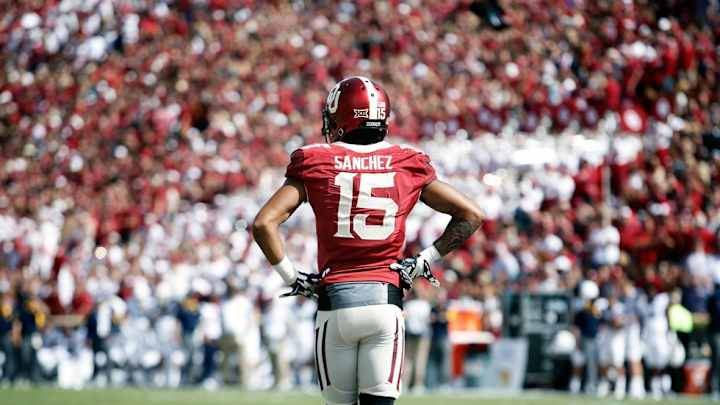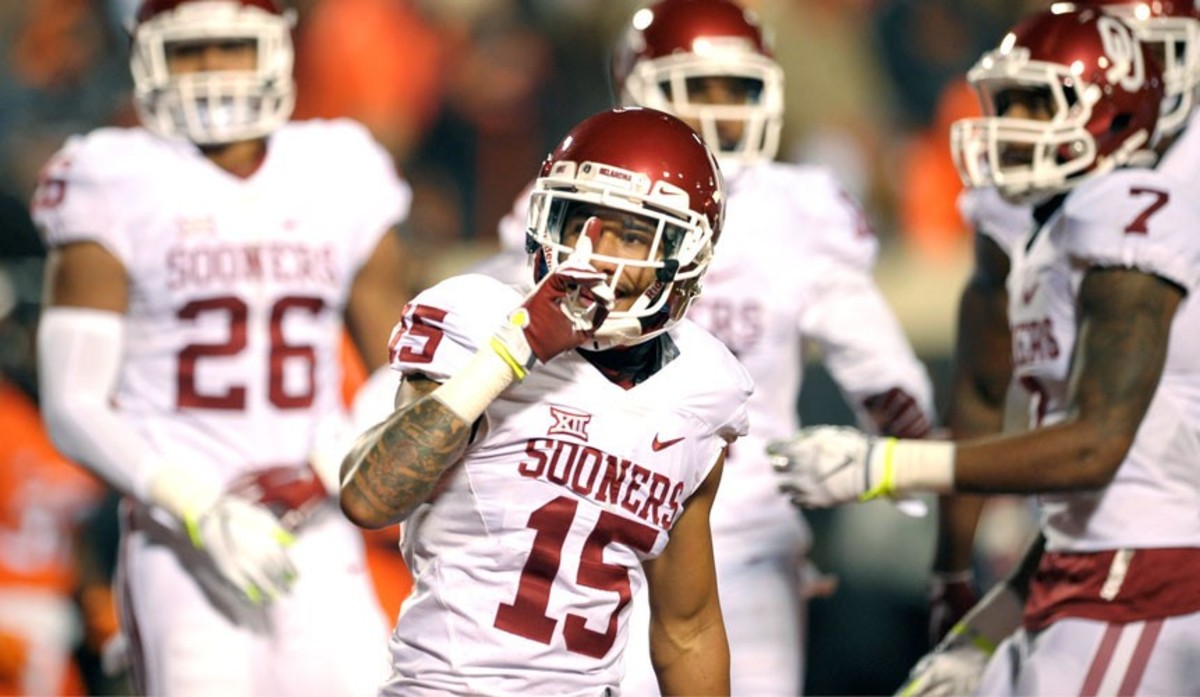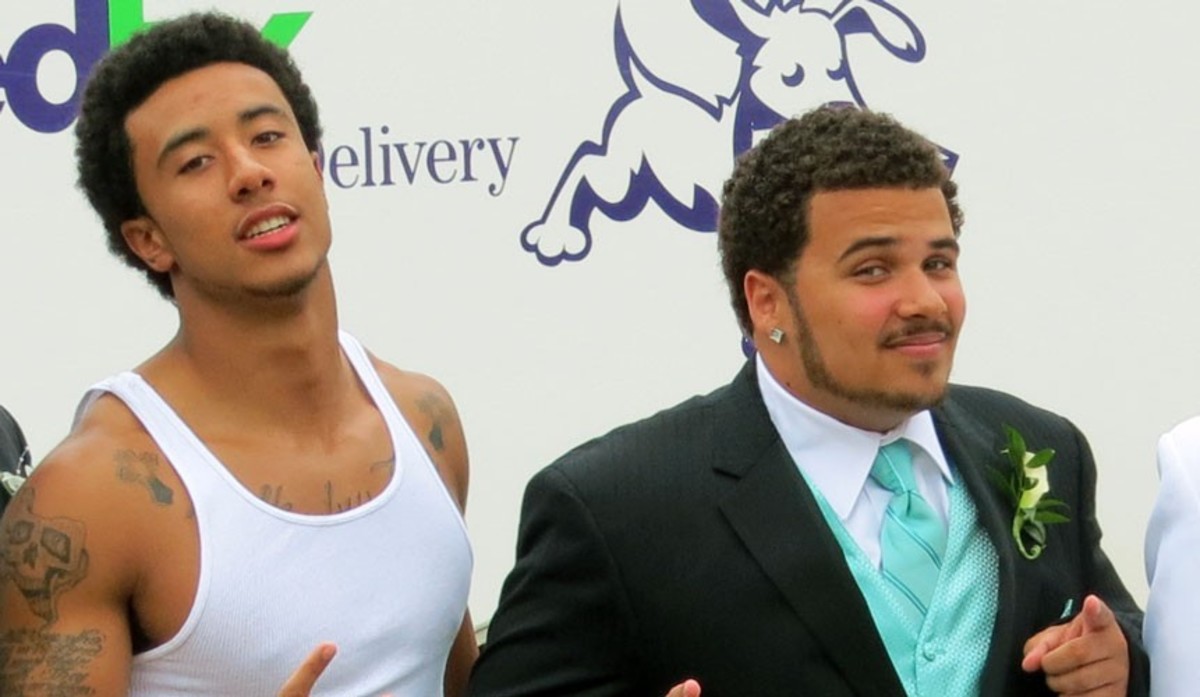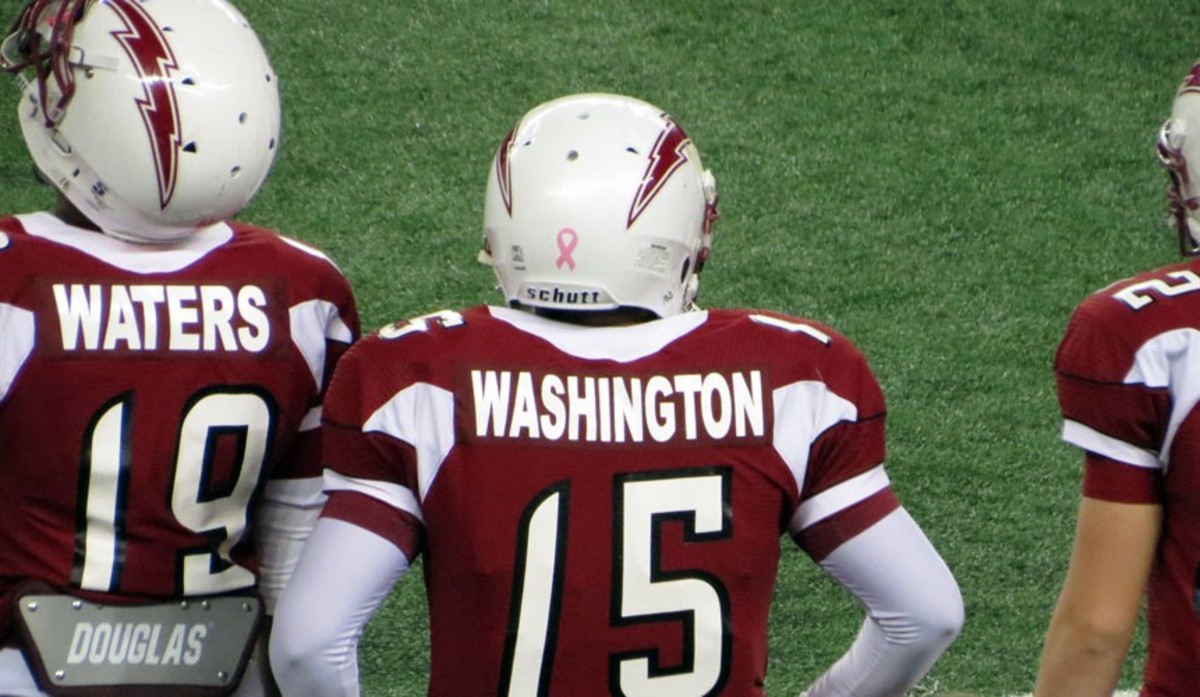Learning to fight again: Oklahoma cornerback Zack Sanchez and the friend who inspires him to succeed

NORMAN, Okla. — Zack Sanchez hears so many voices, they blend together, then drown each other out.
From his mother: You're not going to fail. From his high school coach: Learn to calm yourself down. From people back home in Fort Worth, Texas: You're gonna to be just like the rest of them, back here, dealing drugs. From his older cousin Raul, now doing time in prison: Don't pick this life. From his college coaches: Stay aggressive, but learn to pick your spots. From Oklahoma football fans: We hate you. But now: We love you. And from his best friend in high school, whose voice rises above the rest: Almost there. One more step.
Sanchez talks back to that last one. He tells Kevin Washington II about the plays he is going to make, the interceptions he is going to grab, the receivers he is going to lock down. He asks for help, prays for protection and whispers that he needs a spark. He counts on Kev to supply it, and Kev always does.
Sanchez and Washington knew each other for just over a year, and Sanchez still isn't sure why they bonded so quickly, or why, in a group of loud and boisterous friends, it was the soft-spoken Washington who drew his attention. But on July 16, 2012, when Sanchez got a call from a high school buddy informing him that Washington had been shot and killed at a party the night before in Charlotte, N.C., it devastated him. The Sooners cornerback dropped to his knees in his dorm room in Norman, crying, screaming and begging God to bring him back. "Cried my eyes out," Sanchez says now. "Like a little baby."
On Thursday, Sanchez and No. 4 Oklahoma (11–1) will meet No. 1 Clemson (13–0) in the Orange Bowl semifinal, with a trip to the College Football Playoff title game on the line. It will mark the next step in the Sooners' march toward a possible eighth national championship, and the second under coach Bob Stoops. It's a surprising destination on a journey littered with roadblocks. Just 11 weeks ago, Oklahoma lost to Texas 24–17 in the Red River Rivalry, a major upset (the Longhorns were just 1–4 entering the game) on the heels of a season defined by disappointment. (Oklahoma went 8–5 in 2014 after coming into the year ranked No. 4 by the AP.) Since that defeat, however, the Sooners have won seven straight, and Sanchez has played a key role: The redshirt junior All-America has picked off a team-leading six passes, broken up seven others and made 44 tackles. He has helped Oklahoma's secondary go from burnt (276.2 passing yards per game allowed in '14) to best in the Big 12 this fall (201.5 in the same statistic).
Sanchez says the Sooners are in this position because after getting knocked down in 2014 and again in October, "We had to learn how to fight again."
It's a path he knows well, because he's been down it before.
*****

Brody Schmidt/AP
Yvette Sanchez cannot remember all the times she had to drag her son inside because it got too late and too dark to play in the street. But she remembers this: He had moxie for days.
"For some reason he was always drawn to older kids," Yvette says. "He's three or four years old and playing baseball in the street with older kids, arguing with me when I tell him it's time to come inside, telling me he needs to be out with them because he's good enough to play with them. He's always had this chip on his shoulder, always been out to prove he belongs. Did you know in fourth grade he told me, 'Mom, you and dad aren't gonna have to pay for college, I'm gonna get it paid for with football.' Look at that, he kept his word!"
In fact, he really did make it happen. Sanchez, a longtime Sooners fan, says that in high school he called up then Oklahoma (and current Clemson) defensive coordinator Brent Venables and bluntly asked if he was interested in signing another defensive back. Sanchez explained to his family that he badly wanted to be part of a program "where every single year, you have a chance to be a champion." Says his high school receivers coach, Robert Morris, "How can you argue with an 18-year-old who wants that?"
But that fearless attitude could be a hindrance, too. At Central High in Fort Worth, Sanchez had a habit of talking back to teachers and coaches. In an era when most people are so reliant on technology that they haven't memorized anyone's phone numbers, Sanchez can recite both his parents' cell numbers by heart. He sheepishly admits it's because administrators dialed them frequently, usually with the news that Sanchez was in trouble again. "I was a punk, I'm not gonna lie," he laughs now. "A hothead."
In football, that created occasional problems. Sanchez played cornerback and receiver in high school (he had nine interceptions and caught 45 passes for 994 yards and 13 touchdowns as a senior) and Morris often wonders what type of playmaker his star pupil could have become if only he'd been more disciplined. "In spring of his junior year, we had put in a run-option play," Morris recalls. "Zack was a quick-hitch guy, so he'd catch it at the line of scrimmage and all we needed him to do was pick up positive yardage. We run it three times in a row, and he gets 4-7 yards, just what he's supposed to. Just move the chains.
"But he never scores, and that frustrates him. He snaps his helmet off, he's upset on the sideline. I go over and tell him we're satisfied with the results but he wasn't hearing it. For Zack, and he's always been like this, since his peewee football days—every time the ball is thrown his way, he thinks he's gonna make a play."
When Sanchez did, it was Washington who would compliment it. Then he'd remind Sanchez the best player on the field is supposed to be a human highlight reel and please, dude, tone it down with the smack talk.
For months, Washington had been the one to playfully egg on Sanchez, telling him he couldn't get away with that high school crap at Oklahoma, that he'd better step his game up in the Big 12. If Sanchez got beat on a play, Washington was the first to let him know, chattering in his ear about the humiliation Sanchez should feel. But then he'd get serious, telling Sanchez that he had a gift, and he better not blow it. "You've got the ticket out, and you've gotta make it out for the rest of us," Washington said, and Sanchez shouldered the responsibility proudly.
"An old soul," Sanchez says. "He just had that aura about him. Most encouraging dude I've ever been around in my life."
Washington came from Charlotte and, like Sanchez, had seen family and friends detour into a life of drugs and recklessness. Neither was raised by his birth father—Rudy Sanchez met Yvette when Zack was three and adopted him when Zack was 14; Zack considers Rudy the only dad he has ever had—which helped form a quick bond. Washington had a passion for football, playing fullback and telling Sanchez he needed to get good enough to one day play for the Miami Dolphins, Washington's favorite NFL team.
Together, they made plans. But what happens when one person can't show up?
*****

Courtesy of Cindy Arnold
Sanchez went through most of July and August 2012 numb. Initially in disbelief after Washington's death, he grieved the loss privately, in his dorm room. Coaches didn't learn what happened until almost a year later.
"For two weeks, I woke up, went to class, went to workouts, came back and locked myself in the room," Sanchez says. "I didn't know what to do."
Back in Fort Worth, Yvette worried about her baby—Zack is the youngest of two children—and called daily to check on him. He responded the same each day: "I'll be fine," he told Yvette. But she fretted anyway.
"I remember that day so clearly," she says. "I was at a baby shower, he called me and he was just bawling. And I freaked out, because he was in Norman all by himself. What if he gets so emotional, he wants to quit?"
Then, in November, another devastating blow: Sanchez's older cousin, Raul Medina, was sent to prison after pleading guilty to federal charges of conspiracy to possess with intent to distribute and distribution of a controlled substance. Currently serving time in Montgomery, Ala., Medina, 33, is scheduled to be released in June. Sanchez declines to go into details, but acknowledges that despite his parents' best efforts to keep him away from negative influences, there were multiples instances of "wrong place, wrong time, wrong people" for him during high school. "I was around a lot of drug dealing, stupid stuff like that," Sanchez says. "When you're a kid, sometimes you do your own thing and it's dumb. Ultimately, football is what saved me."
Yvette says that during Zack's childhood, Medina told him to look around, take stock of what was going on and make different life decisions, because he had the freedom and talent to do so. For his part, Sanchez does not begrudge Medina for the mistakes he made.
"People wouldn't necessarily agree with him being my role model, but what you have to understand is, first, I wasn't old enough to [fully] understand what they were doing," Sanchez says. "Everyone has their struggles. You've gotta eat, gotta survive, gotta take care of your family. The way he hustled, it was different, but it was always about feeding the family. That instilled a lot in me. People who do bad stuff, it doesn't always come from a malicious place in your heart. I will never fault him for that."
Still, losing Washington and Medina gutted Sanchez. Compounding heartbreak in his personal life, football wasn't an escape. He struggled early and remembers—now with a laugh, but at the time he found it far from comical—going up against standout wide receivers Kenny Stills and Justin Brown and getting torched in 7-on-7 drills. Coaches redshirted Sanchez in 2012, a move that surprised and frustrated him.
For months, he battled a shaken confidence and new reality. Then, a conversation with Cindy Arnold, Washington's mother, changed his outlook. She told Sanchez that quitting wasn't an option, because Washington, his biggest fan, wouldn't have had it.
Before his redshirt freshman season in 2013, Sanchez told Arnold and his parents that he wanted a daily reminder of who played for. He'd already bookmarked the Web story about Washington's death on his phone—he still looks at it regularly—but he also needed a public declaration, something that could start conversations. He wanted Washington's legacy to live on. So, he picked jersey number 15, a nod to Washington's high school number, as well as the day he passed in July 2012. The gesture moved Arnold, who talks with Sanchez via text almost every day.
"It's hard to see someone wear 15 who isn't your son, but at the same time Zack is his brother," Arnold says. Sanchez checks in on her every time he is back in Fort Worth, though it's hard for him to visit Washington's house: Sanchez last saw Washington in the driveway there, when he came to say goodbye before heading to Oklahoma just weeks before Washington died. Walking back up the driveway brings a flood of memories. On Christmas Day, Sanchez took Arnold's hand and told her, "I know it's tough, but that's why I'm here."
Tears come easily when Arnold talks about Sanchez, but to some degree, they're good tears. "When he hugs me, I know this sounds crazy, but I feel like it's my son hugging me. There's a part of Kevin in there."
*****

Courtesy of Cindy Arnold
Sanchez loves the secondary because he relishes being either the hero or the villain, and the pressure that comes with each snap. Being fearless is a big part of why he excels. "He ain't scared, that's for sure," says Oklahoma defensive coordinator Mike Stoops. "He wants [opposing quarterbacks] to throw at him every time. He thrives on that challenge." Sanchez heard the doubters back home who taunted him following the Sooners' 40–6 loss to Clemson in the Russell Athletic Bowl last December. He vowed the next time he came to town, he'd be wearing a Big 12 championship ring. Over Christmas break, he was able to do exactly that.
During the last week of on-campus practice this month, Sanchez, senior linebacker Eric Striker and senior defensive end Charles Tapper stayed up until 5:00 a.m. one night reminiscing about the last four years. They reflected on their paths to this point (Sanchez had committed to Baylor before flipping to Oklahoma just before Signing Day in 2012) and remembered back to fall camp in '13, which Sanchez describes as "16 days of straight hell." It was worth the pain, Sanchez says, because each earned starting spots that August. This year, each was named first-team All-Big 12. It's an especially meaningful honor for Sanchez, who missed games against Kansas and Iowa State because of an injured right ankle, snapping a streak of 33 consecutive starts dating back to 2013.
They talked about the chaos of the last 12 months, from the coaching staff changes (Oklahoma had eight assistant coaching positions change this off-season) to the on-campus drama (Norman was the subject of national news after a racist fraternity video leaked in March) to the defeat that forced them to come together. After the loss to Texas in October, Sanchez says there was a familiar, but different, feeling in the Sooners' locker room: They had been to the bottom before. Only this time, they knew how to climb back out.
Sanchez says that in 2013, he, Striker and Tapper attacked practice with an unmatched energy and hunger. He saw that same fire again this spring from the entire roster, when "guys understood, no one wanted to taste that disappointment again." The message of the last few weeks has been one of, Look how far we've come. It's a mantra Washington would have embraced.
"If you'd have told me right after Kev's death, this is where I would be, I'd say you were crazy," Sanchez says. "To tell me I'd come back from that, and be a starter, be playing for a national championship. He'd be so proud—and he'd still be giving me crap about getting beat sometimes."
Before each game, Sanchez traces Washington's initials in the grass, asking his best friend for a spark. He still doesn't understand why someone so young and so good was taken away so suddenly, but wonders if it happened to wake up the people around him. Of course he wishes Washington could come back, he says. But he knows that can't happen. And he knows that taking the good isn't just what Washington would want—it's what he would expect.
"I always knew I was good," Sanchez says. "And now that I'm healthy, if it's mano a mano, you can't beat me. But I never got that recognition before, and that's what drove me."
Now, it's Washington driving him. Almost there. One more step.
